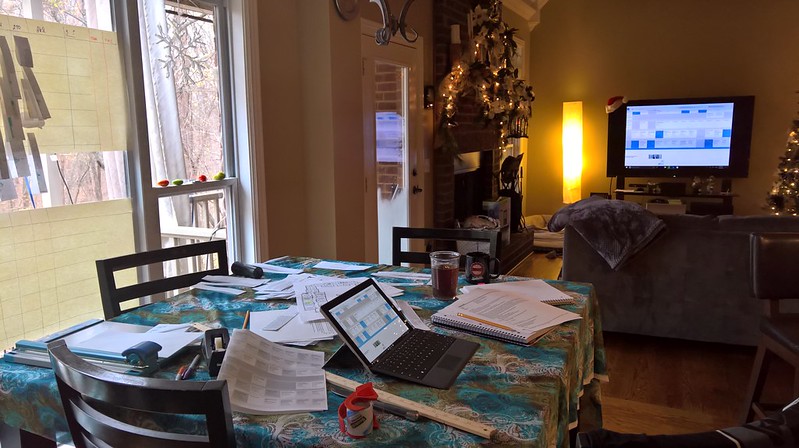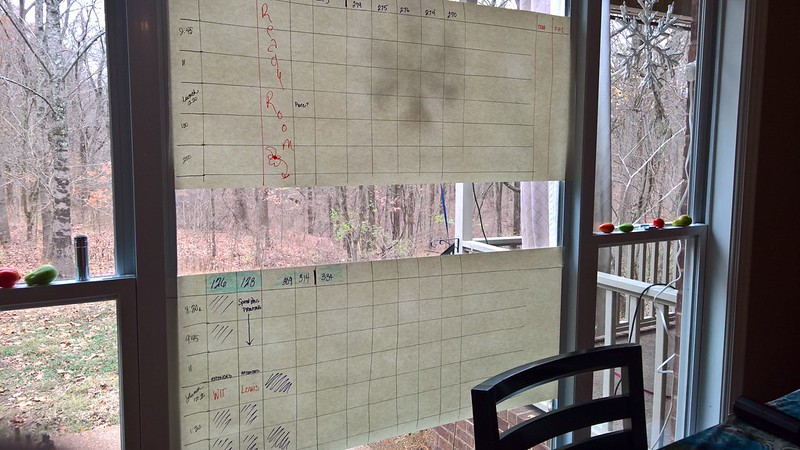So in the previous post we discovered how each SQLSaturday gets sessions for their event; if you missed reading that, the short answer is that it is all up to the speakers in the #SQLCommunity. Now we are going to figure out how schedules are made.
How many sessions do we choose?
Well, some events select every speaker and just build out a schedule from there. Some events use a different method; this is the most common way: # of predicted attendees /number of seats in a room = # of rooms needed, and then # of rooms * # of time slots = # of sessions needed. The second equation is used for smaller events that just have a set number of rooms available (this is also how events set attendance goals and registration limits for wait listing).
The selection process?
Now here is where things get tricky and different for each event. There is the goal of trying to fill a track; remember that each event picks tracks and as always they are at the mercy of speaker submissions. Some tracks like Professional Development and Other are generally not filled because we doubt attendees are spending their Saturday learning PD and other exclusively.
Some cities are fortunate and have both a regular SQLSaturday and a SQLSaturday Business Intelligence Edition. In this case, the regular event would still have BI Sessions, but it’s unlikely the BI edition would have regular sessions. An event’s attendance base will dictate the session topics and the quantity. For instance, here in Nashville, there hasn’t yet been an big uptake on Azure, therefore we don’t go to crazy on those sessions.
Friends first?
Now, I will admit I am more than happy and very willing to pick my friends first. However it isn’t just like on the playground in grade school. This time it’s about trust and knowing someone has your back, is going to do everything they can to be there and not let you down. I’ve heard responses from several organizers that aren’t quite this bold but are very similar in sentiment. But, when you have done these events either as a speaker or an organizer for a while, how can you say everyone isn’t your friend?
Speaker Popularity
Honestly, organizer generally know which speakers are popular and they are great to have at your event. Local speakers are even on this popular list–attendees are very happy to see these folks.
Session difficulty level
Everyone wants to provide a good mix of sessions that will make everyone from beginners to seasoned professionals happy. But that isn’t always the easiest thing to do. Again, event organizers are at the mercy of speakers submitting sessions.
I’ve asked other organizers how they get through this process. Some start with a rating process with sessions or speakers and sometimes both. Some start by removing speakers that submitted even though they forgot they didn’t show up to that event in the past. Sometimes an event can’t afford to have more than x number of speakers, so to reduce the number of individual speakers, they ask some to present more than one session. Some gather the team and sit in a room until the section process is done.
Building the Schedule
First, speakers are offered a chooser for preferred time slot and most events try really hard to follow this preference. I’ll be honest, one year we had like 4 people say morning and everyone else said afternoon. When scheduling 50 sessions that doesn’t work out very well.
Venues
It sounds really odd, but venues play a big role into the schedule. Popular sessions will be well-attended so they need bigger rooms. Where the sponsors are located sometimes plays a role in where sessions are. For example, if session rooms are separated by the sponsor area it benefits the sponsors if tracks move from one side to the other during the day. This creates traffic flow through the area. Sorry for the extra steps everyone, but we need sponsors to be happy: they provide the funds that make these events happy.
Topics/Tracks
Organizers should try to spread topic/tracks out over the entire day. You shouldn’t have 4 the 5 BI sessions scheduled in the same two time slots; that just doesn’t make sense to attendees. One great option is to schedule similar topics but different difficulty levels at the same time. Making sure that each time slot has a variety is the ultimate goal but again events are limited to sessions submitted by speakers.
Speakers
So, as a speaker who is married to another speaker, I really appreciate when we don’t speak at the same time. I mean, we are each other’s disaster recovery when it comes to hardware. Sometimes speakers can do an event but later find out they need to leave early to attend other obligations. Some speakers have work obligations so they prefer am/pm time slots. Some of us are just cranky in the morning. There were several events before we found our AWESOME dog sitter that we had to leave early to get home because we could only be gone one night. We organizers do their best to accommodate speakers and fill in a great schedule.
Lunch Sessions
This is crazy! Some events reserve lunch sessions to their topmost sponsors, and others just have sessions the whole day and serve lunch for an extended period of time (or have boxed lunch – grab and go to a session). Why so? Offering only top sponsors a lunch session increases the attendance for that session. Just handing out box lunches and sending everyone back to sessions gives attendees a greater opportunity for learning. Why have sessions during lunch at all? Well, evidence (experience of others) shows that if there isn’t a reason to stay, a lot of folks might leave for lunch and might not make it back.
About Nashville

Sometimes I have help in selecting sessions; some years it’s just me, the basset hounds and my husband. We almost always ask for feedback on must-haves! The first round is picking speakers–local ones are nearly always in. The last several years we’ve had the sessions printed out on tabloid paper and then we cut them out. After that we sort them by track and narrow them into “IN”, “GOOD”, “MAYBE”, and 2nd/Alternate. We use last year’s schedule to prevent repeat sessions (we only consider repeat if by same speaker). Now it’s time to play pin the session on the schedule.

Here are the numbers from last year’s event
| # of Submissions | # Selected | Track |
| 12 | 6 | BI Analytics and Visualization |
| 16 | 7 | BI Architecture & Management |
| 3 | 2 | Cloud Database/Application Development & Deployment |
| 45 | 20 | Database & Application Development |
| 51 | 25 | Database Administration |
| 6 | 2 | Other |
| 8 | 3 | PowerShell |
| 7 | 4 | Professional Development |
| Session Difficulty Level | ||
| 54 | 30 | Intermediate |
| 6 | 3 | Advanced |
| 88 | 36 | Beginner |
Final thoughts
No matter how hard organizers try, things are never perfect. Events have to prepare the schedule early enough that speakers can make travel arrangements. But sometimes things come up and speakers need to cancel. Organizers try to fill a schedule with enough variety to keep everyone in their community interested, but again, organizers are at the mercy of speakers! A lot of thought goes into each and every event, so remember to thank an organizer the next time you are at a SQLSaturday.
Leave a Reply